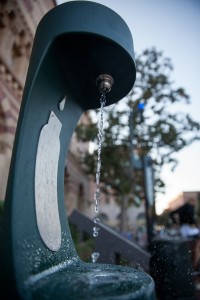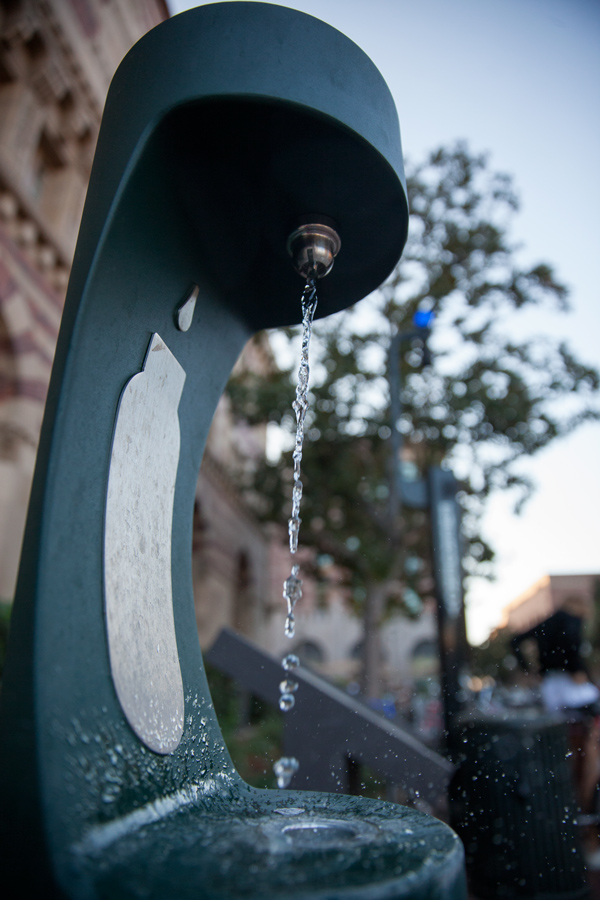USC launches campus crowdfunding website
USC launched a pilot crowdfunding program earlier this month for faculty, staff and students to fund their projects.
The program, dubbed Ignite USC, is a combination of the famed Trojan Family network and crowdfunding websites such as Kickstarter. It aims to serve as a way for students and faculty to raise funding for meaningful projects that might not otherwise get exposure.

Drip drip · Cardinal and Gold Goes Green, one of the two featured projects for Ignite USC, aims to increase the number of water refueling stations around campus to reduce the usage of plastic water bottles. – Ralf Cheung | Daily Trojan
Donations to projects will be counted toward the university’s campaign to raise $6 billion in funds. Projects will receive 100 percent of donations earned.
“We liked that model, specifically for higher education,” said Tracey Vranich, vice president for advancement services at USC. She mentioned that companies like Kickstarter take a percent commission for services while Ignite USC eliminates that element.
“It’s a great way to get people involved in a grassroots sort of way,” she said.
The USC Provost’s office will be overseeing the site, and is currently testing the idea with two featured projects.
The first, Cardinal and Gold Goes Green, is an initiative to add to the number of water refueling stations around campus in an effort to reduce plastic water bottle usage. The second is MED SRG, a non-profit that aims to ship excess surgical supplies to established nonprofits around the nation that perform surgeries in developing countries.
Both projects have already made headway towards their respective goals in the few days since Ignite USC’s launch.
MED SRG founders and 2014 USC graduates Chris Shafer and Anish Parekh are both excited about the new initiative, saying it is integral to the young nonprofit’s future success. Their company specifically aims to help nonprofits that work internationally in places where medical supplies are incredibly rare.
“We’re putting our heart and soul into this campaign, and we really hope the Trojan Family is going to recognize both the program and our project,” Shafer said.
MED SRG already has an administrative and logistical framework, and the co-founding pair hope to begin the practical aspect of collecting boxes and shipping supplies with the funding raised through Ignite USC.
Similarly, Cardinal and Gold Goes Green also has a framework in place aimed at their goal of reducing waste. Their project is backed by the USC Environmental Studies Program and the Wrigley Institute for Environmental Studies.
Michael Young is a part of the team for Cardinal and Gold Goes Green. He believes Ignite USC is a great way for the community to get involved.
“USC is a big enough community that we could have a serious impact,” he said. “I can see [Ignite USC] growing and creating lots of change on campus.”
Vranich said that the Provost’s office will be looking for compelling projects that have a direct tie to the university to feature on a potentially monthly basis. The success of the two current projects will inspire growth of the site.
Parekh believes that the site has potential to grow the USC community as well.
“On a larger scale, I think Ignite USC is really cool because it is going to concentrate the entrepreneurial spirit we have at USC, and create a community of startups,” Parekh said.

